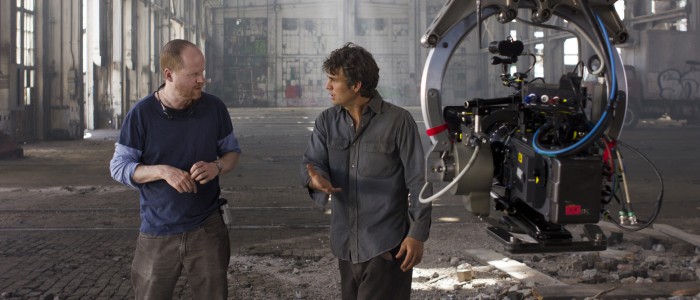Joss Whedon Has Some Concerns About Binge-Watching (And He's Completely Right)
Buffy the Vampire Slayer turned 20 last week, leading the entire internet to reminisce about the greatest television show of all time (the cold hard truth) and what it meant and still means to them (a great deal). In the midst of it all, series creator Joss Whedon, who has since graduated into the world of big-budget moviemaking with the likes of The Avengers, spoke about the series...which meant that he spoke about television in general...which meant that he talked about the shifting TV landscape spurred on by Netflix and binge-watching.
And he has concerns about it all. And he's right to have concerns.
The Comments
Speaking with The Hollywood Reporter (that whole interview is worth a read if you like Buffy and/or Whedon), the creator of Angel and Firefly revealed that he's not especially fond of entire television seasons being dropped all at once, both as a viewer and as a creator:
I would not want to do it. I would want people to come back every week and have the experience of watching something at the same time. We released Doctor Horrible in three acts. We did that, in part, because I grew up watching miniseries like Lonesome Dove. I loved event television. And as it was falling by the wayside, I thought, 'Let's do it on the internet!' Over the course of that week, the conversation about the show changed and changed. That was exciting to watch. Obviously Netflix is turning out a ton of extraordinary stuff. And if they came to me and said, 'Here's all the money! Do the thing you love!' I'd say, 'You could release it however you want. Bye.' But my preference is more old-school. Anything we can grab on to that makes something specific, a specific episode, it's useful for the audience. And it's useful for the writers, too. 'This is what we're talking about this week!' For you to have six, 10, 13 hours and not have a moment for people to breath and take away what we've done ... to just go, "Oh, this is just part seven of 10," it makes it amorphous emotionally. And I worry about that in our culture — the all-access all the time. Having said that, if that's how people want it, I'd still work just as hard. I'll adapt.
Whedon continued, explaining that "binge-watching," where you sit down and an entire season or more of television in one sitting, could dilute the power of a show:
The more we make things granular and less complete, the more it becomes lifestyle instead of experience. It becomes ambient. It loses its power, and we lose something with it. We lose our understanding of narrative. Which is what we come to television for. We come to see the resolve. I'm fond of referencing it, but it's 'Angela Lansbury finds the murderer.' It's becoming a little harder to hold on to that. Binge-watching, god knows I've done it, it's exhausting — but it can be delightful. It's not the devil. But I worry about it. It's part of a greater whole.
Why He's Right
My greatest television memories don't involve binge-watching shows on Netflix. My greatest memories involve weekly gatherings to watch Game of Thrones, where mead and meats were served and everyone spent an hour talking about the episode afterward. My greatest television memories involve going to a local theater to watch new episodes of Breaking Bad with a packed house, transforming the already intense show into a communal experience. My greatest television memories involve watching Lost week-to-week, agonizing and theorizing in the weeks between with my friends, trying to assemble that unsolvable puzzle.
Over the decades, television has learned to take advantage of the time between episodes, to tell stories that hooked us from week-to-week. The best television shows, from Buffy to Mad Men, found ways to tell complete, one-hour stories that also advanced a larger narrative. Every sitting felt complete, even as you were drawn toward the next chapter. Heck, many shows transformed commercial breaks into an art form unto themselves, taking advantage of those quick breathers to build to mini-climaxes before breaking off.
The Netflix model, where an entire season arrives at once and you're encouraged to just plow through, is not inherently evil, but it can take the fun out of watching television. Right now, I'm engrossed with FX's Legion and the time between episodes has proven vital to my enjoyment of the series. Its ideas and characters and images are allowed to marinate in my mind and the anticipation makes each episode sweeter. The delayed gratification makes every maddening mystery all the more fun. I would certainly enjoy Legion if I watched it all in one-go, but it would be Just Another Thing I watched and not something that dominates my thoughts. Would the first season of Westworld have been a phenomenon if the internet wasn't allowed to dissect it and take deep dives for six days between every new chapter? Surely not.
And this is before we address how so many of Netflix's original series, from House of Cards to Daredevil, feel hopelessly padded. Freed from having to hook viewers from week-to-week, these shows can grow monotonous, with one episode simply blurring into another. I can't name any individually great hours of Jessica Jones (a show I quite like), but I can ramble off my favorite episodes of Deadwood and Breaking Bad and Battlestar Galactica, shows that worked to ensure that every hour stood alone.
Binge-watching is okay. It's fine. It's not the end of the world. It can be really fun. But the best television shows tend to be those structured for slower consumption. And, quite frankly, those shows are always, without question, the most fun to binge.

